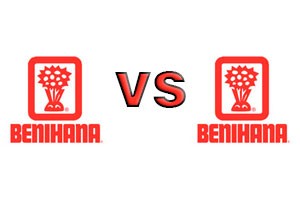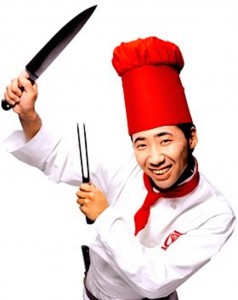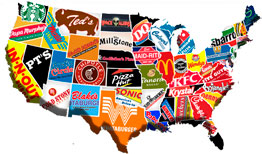 The widow of company founder Rocky Aoki contends that a legal brawl over the way burgers are sold at a Honolulu restaurant is part of a ploy by a New York private equity firm to control the restaurant empire. The sizzling case is expected to come to a head later this month.
The widow of company founder Rocky Aoki contends that a legal brawl over the way burgers are sold at a Honolulu restaurant is part of a ploy by a New York private equity firm to control the restaurant empire. The sizzling case is expected to come to a head later this month.
Two years before he died, famously flamboyant Benihana founder Rocky Aoki became embroiled in a lawsuit against four of his six children whom he accused of trying to wrest control of the restaurant empire from him. The situation had grown so nasty that New York magazine dubbed it “Rocky’s Family Horror Show.”
When he died at age 69 in 2008, Aoki left behind an estate reportedly worth $50 million and a legacy of dinner theater in the form of Japanese chefs using their knives like samurai swords, creating steaming “volcanoes” out of stacked onion rings and executing the ever-popular shrimp-in-the-pocket catch.
His death also paved the way for a power struggle over franchise rights. His widow and third wife, Keiko Ono Aoki, who serves as CEO of Benihana of Tokyo, not only has to contend with the usual squabbles between potential heirs but also a contentious licensing dispute involving the company’s very profitable Honolulu restaurant. Aventura-based Benihana Inc. owns the restaurant’s franchise rights and terminated that agreement last year, ostensibly over a hamburger.
Later this month, a three-year wrangle over those franchise rights comes to a head as arbitration is slated to begin in New York. At issue is whether the Honolulu restaurant will be allowed to continue to operate under the Benihana name.
Despite their common name, Benihana Inc. and Benihana of Tokyo are two distinct companies, although both adhere to the standard of quality Rocky Aoki established for his restaurants. Where they differ is in their licensing agreements. In the mid-1990s, they divvied up the territory into distinct geographic areas.
Benihana Inc. owns the trademark “Benihana” — named after the red safflower that also served as the name of the Tokyo coffee shop Rocky’s parents owned — inside the United States, Central America, South America and the Caribbean.
Benihana of Tokyo owns the right to run the Honolulu restaurant and develop Benihana restaurants everywhere else in the world.
Court records show Keiko Aoki believes the legal wrangle over the Hawaii restaurant is a ploy to devalue the restaurant and force a cheap sale of Benihana of Tokyo.
Her attorney, Joseph L. Manson III, spelled it out: “From Benihana of Tokyo’s point of view, this is all about a strategy … to increase the litigation costs of Benihana of Tokyo and force Benihana of Tokyo to sell. Mrs. Aoki has said that they may have a reason to buy, but she doesn’t have a reason to sell.”
A BUN AND A BEEF
The argument began as a battle over burgers, sparked after the Honolulu restaurant added the beef-on-a-bun to its menu. Benihana Inc. maintains serving the classic American sandwich in the restaurant known for its Japanese teppanyaki offerings damaged the brand.
As tensions mounted between the parties, Benihana Inc. also found fault with the Honolulu restaurant’s advertising, the color of the restaurant’s nearly 50-year-old original roof tiles, its choice of butter, salt and pepper, and even its use of balloons during children’s birthday parties. Benihana Inc. also took exception to a hip-hop duo the widow hired to liven up the atmosphere, citing their “lack of talent or charm.” Last year, Benihana terminated its franchise agreement with the Honolulu restaurant.
A three-member panel from the American Arbitration Association is slated to convene to determine whether the restaurant violated its franchise agreement when it added hamburgers to its lunch menu without obtaining prior approval. The panel also will review whether Benihana Inc. overreacted by terminating the contract or whether it was reasonable to do so. The arbitration could go on for the better part of a year, according to the parties involved.
In the contentious area of franchise law, such scenarios are somewhat common, said Martin Segal, a longtime Miami lawyer who lectures on business law at the University of Miami School of Business. “It reflects a situation where one of the parties is trying to use a technical violation that they allege to be a substantial enough violation to terminate the agreement,” Segal said.
But the Benihana vs. Benihana burger bash goes beyond even normal legal fisticuffs. Terminating an agreement over a menu change is rare, said Robert Emerson, editor-in-chief of the American Business Law Journal and a business law professor at the University of Florida. “There are all sorts of areas where you can have disputes,” Emerson said. “This is not one that I’ve heard that much about.”
Benjamin Litalien, who teaches franchise management at Georgetown University, agreed that it is rare for a franchisor to take the “nuclear option” of terminating a franchise agreement. However, he said, the franchisor has a fiduciary responsibility to maintain the integrity of the brand name: “As a franchisor, you cannot allow any one franchisee to color outside the lines at the expense of the other franchisees.”
Manson likened his client’s ongoing legal woes to another film, this one a classic epic. “This is obviously Gone With the Wind,” he said. “It’s a long saga.” And like a Southern Gothic tale, the parties involved all are intertwined.
THE TWO BENIHANAS
On the one hand, there’s Benihana of Tokyo, the New York-based company that Rocky Aoki created in 1963, the year before opening his first restaurant in Manhattan. After several years of expansion that included dozens of new restaurants featuring teppanyaki-style dinners prepared by chefs in Benihana’s signature red toques, Benihana National Corp. was created in 1982 to handle the company’s initial public offering.
Twelve years later, the company underwent another restructuring, with the creation of Benihana Inc., which merged with Benihana National Corp. In 2012, New York private equity firm Angelo, Gordon & Co. bought Benihana Inc. in a deal valued at about $295 million. In the mid-1990s, Benihana of Tokyo and Benihana Inc. divvied up the territory into distinct geographic areas.
Benihana Inc. owns 96 restaurants in the United States, including 63 Benihana restaurants, eight Haru restaurants and 25 sushi restaurants, according to court documents filed by Benihana Inc. in Hawaii last month.
Benihana of Tokyo, on the other hand, started with 15 restaurants when the widow took over operations, her attorney says. “At the end of this year there will be 26, and next year there will be more than double the size when she took over,” Manson said. “So, it’s quite understandable why Angelo, Gordon wants to acquire Benihana of Tokyo because … they’ll see the most significant growth has been in international operations.” And Benihana of Tokyo owns the most territory. “About 90 percent of the world’s population lives in the countries where Benihana of Tokyo has franchise rights,” Manson said, “and about 80 percent of the globe is Benihana of Tokyo’s.”
THE COURT BATTLE
According to the Hawaiian lawsuit, Angelo, Gordon & Co. and Benihana Inc. want to force a hostile takeover of Benihana of Tokyo. “
[Angelo, Gordon & Co.] wants to purchase [Benihana of Tokyo] and consolidate all of the Benihana restaurants under its unified ownership; however, the firm has not offered [Benihana of Tokyo] an acceptable price,” attorney Gary Victor Dubin said in a unfair competition complaint filed on behalf of Benihana of Tokyo in December in the First Circuit Court of Hawaii. “When [Benihana of Tokyo] rejected the company’s overtures, [Angelo, Gordon & Company] and [Benihana Inc.] went on the offensive. In a concerted effort to force an unwilling [Benihana of Tokyo] to sell, the defendants have engaged in a strategy aimed at inflicting damage to [Benihana of Tokyo’s] well-developed reputation and simultaneously financially degrading the company.”
Balderdash, says the lead attorney for Benihana Inc. Although not authorized to speak on the record, Miami attorney Alan Fein maintained in court documents that this latest lawsuit is simply a matter of “forum-shopping,” and should be dropped or consolidated with the New York case that is set for arbitration.
That case sizzles down to whether Benihana Inc. had the right to terminate its franchise with the Honolulu restaurant because it added hamburgers — called Beni Burgers — to the menu without prior approval. The franchise agreement, which was signed on May 15, 1995, states that the restaurant can sell “only such products and services as have been expressly approved for sale in writing” by Benihana Inc., which cannot unreasonably withhold its approval.
The Honolulu restaurant started selling hamburgers on Dec. 26, 2012, and stopped on Feb. 19, 2014, shortly after a New York judge issued an injunction against selling the hamburgers. But the burgers were still available on restaurant property — from a cart outside the building.
“They had stopped selling the burgers,” Manson said. “They told the judge they wouldn’t sell the burgers anymore. Despite the fact that they had told the judge they would not sell any more, despite the fact that they had stopped, an injunction was issued by the court.”
While burgers were no longer sold inside the restaurant, the company started selling them outside, Manson said, “off a cart in the common area. Keiko relied on the advice of an attorney who told her that that was legal.”
Moving the burger sales to the patio did not seem like a satisfactory resolution from Benihana Inc.’s point of view.
After several complaints and attempts to get the restaurant to stop selling the burgers anywhere on the premises, as spelled out in court documents, Benihana Inc. terminated its franchise agreement with the restaurant on Feb. 5, 2014. The restaurant remains in operation while Benihana of Tokyo and Benihana Inc. sort out their differences through arbitration, which is slated to commence this month. If Benihana Inc. prevails, the Honolulu restaurant can still operate, but not as a Benihana restaurant.
Additionally, Benihana Inc. could then open its own Benihana restaurant right next door if it wants to, Manson said.
According to documents filed in federal court in the Southern District of New York, without obtaining prior approval, the Honolulu restaurant added hamburgers to the menu at the behest of the management of Hilton Hawaiian Village on Waikiki, where the restaurant is located.
That argument did not appeal to U.S. Judge Paul A. Engelmayer, who lashed out at a Benihana of Tokyo attorney during a hearing on the case in February 2014. “Who cares whether it’s Hilton or Barack Obama or the pope?” asked an exasperated Engelmayer. “Who cares who tells them to sell burgers? You’ve got an agreement that says you can’t.” Manson reframed the question.
“The real question is why Benihana Inc. would want to terminate the franchise with Benihana of Tokyo over a hamburger,” Manson told the Herald in a telephone interview. “They want to get leverage over the widow to sell the restaurant. It seems to be a bit of a stretch that a franchise should be shut down for serving burgers on the beach. They are right on the beach. It’s a response to a unique market that take their lunch to the beach.”
Benihana Inc. takes the position that hamburgers damages the brand name. “…It’s kind of like if a McDonald’s franchisee was selling tacos or something like that, especially a restaurant, a high-end restaurant like Benihana, where people come and they order steak and shrimp, and I think the average price for an entrée is, you know, $28,” Fein told Engelmayer during a hearing in October 2013.
It should be noted, however, that Benihana actually does sell tacos, three per order, in fact. Its “Trio of Fish Tacos” features “tuna, salmon and tilapia with avocado, grape tomato, shallot salsa and taco sauce.”
Aside from that menu option, from its start as a four-table restaurant on West 56th Street in New York, Benihana has catered to high rollers. None other than Don Draper in an episode of Mad Men acknowledged that Benihana is considered high end. “This place is very expensive,” Draper tells his date, while she sips an umbrella drink from a Benihana staple — a Hotei “laughing Buddha” Tiki Mug.
In the spirit of the laughing Buddha, Benihana of Tokyo has expressed interest in resolving the ongoing dispute — and possibly selling. Manson says he conveyed this interest to opposing counsel, Fein of Miami’s Stearns Weaver law firm.
“I told him if Angelo, Gordon wants to buy Benihana of Tokyo, this is not the way to go about it,” Manson said. “What we need to do first is to settle all the litigation and then we can talk about it.”









Leave a comment